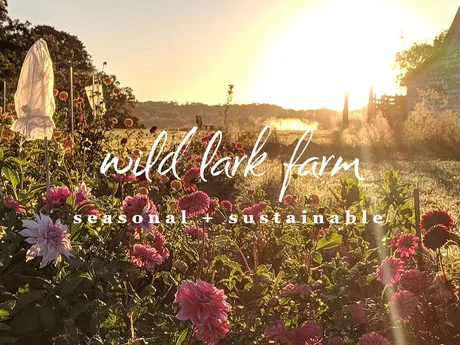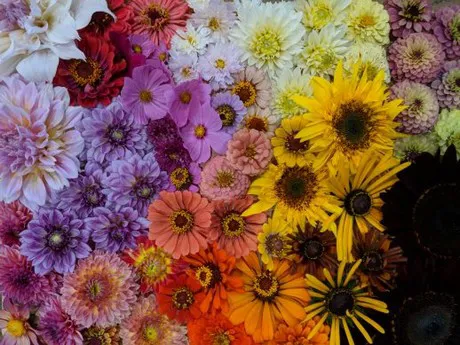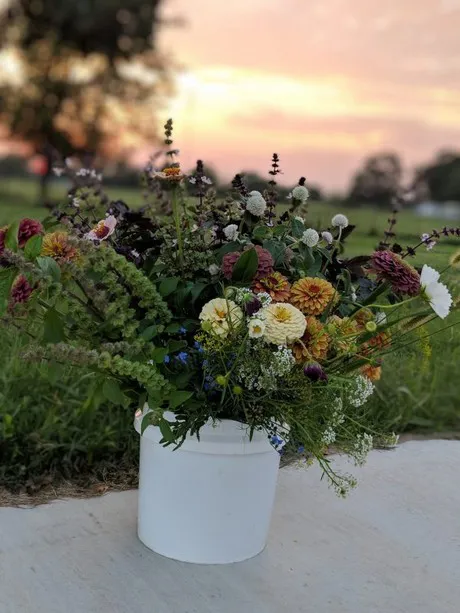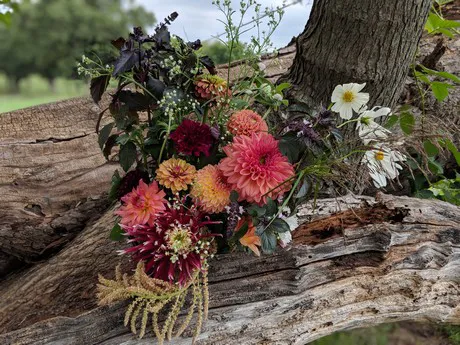For Terri Barr, making the leap from civil engineering technician to flower grower was a natural move. She had farming in her blood, a lifelong love for gardening and a desire to work outdoors.
The result is Wild Lark Farm in Claremore, Oklahoma, which she started in 2018 and is building from the ground up. She’s growing specialty and heirloom flowers – mums, old-school lilacs and sunflowers among them – on about an acre of the 40-acre spread where she lives with her husband and their three children. It’s a former cattle pasture with clay-like soil that she’s slowly transforming into an organic, sustainable growing operation.

But her path to becoming a flower farmer, and earning Certified American Grown status, is decidedly indirect.
She grew up on a farm in Kansas where her family grew corn, wheat, milo and soybeans. She went to college in Oklahoma and graduated with a degree in interior design. But instead of designing rooms, she went to work as a technician in a civil engineering firm. She put her drafting skills to work in designing infrastructure – water lines, sewer lines, parking lots.
But despite working for a company she liked and with “fantastic” colleagues, she knew she wanted to be outdoors. The turning point came in 2017 when she attended a floral workshop in the Mount Vernon area of Washington. It was there that she found what she was looking for. She was with flower people from all over the United States and enjoyed hearing their stories. Everything about it was a good fit.

Photos provided by Wild Lark Farm.
“This is what I want to feel. This is perfect,” she recalls thinking at the time. “There was really nothing like that in Oklahoma. So when I came back here I just decided to give a go.”
As a daughter of farmers, she knew what she was getting into.
“I didn’t go and start this farm with the idea that this is going to be amazing and I’ll be dancing in flowers every day,” she said. “I knew it was going to be hard work. It’s hot and humid and when it rains, it rains too much or it doesn’t rain enough. So, I knew going in that this is hard.”
But it’s where she’s found fulfillment.
“Last year was the first year I really increased what I was growing and really put myself out there. I just wanted to gauge how much interest people had, if they were receptive or if they thought it was just the craziest idea that they’d ever heard. But people have loved it. That’s been really positive.”

She got her first customer by walking into a new florist shop in Claremore with some of her flowers in a bucket.
“I said, ‘These flowers are just for you to use. If you like them, great.’ And I gave them my card. They loved them and they posted them on Instagram.”
The response was almost immediate. Three florists in Tulsa who saw the Instagram post reached out to her to ask if she sold to other people. Her response: “Yeah, sure.”
Those florists have given her a foot in the door and something to build on. In the meantime, she’s building an organic, sustainable operation.
Although she could draw on her farming background, she knew she couldn’t farm like her parents. Practices had evolved and she was adamant about it being organic.
“For one, I have kids and I don’t want all the chemicals and the pesticides out there. I want people to be able to walk out there and be able to touch and can smell everything. So they know what they’re getting is the real deal.
“And since I’ve worked so hard to get my soil in good condition, I want to make sure that it’s sustainable.”
In addition, she feels an obligation to Oklahoma tradition to leave the land better than she found it.

“One of the slogans in Oklahoma is ‘Keep the land grand,’” she said. “People are really conscious that we humans aren’t here forever. You want to keep the land nice, you want to keep it sustainable for people who come after you. A lot of people here have that mindset of make it better than you found it. So, that’s what I try to do.”
Three to five years down the road, she would like to have a farm she can share with the public.
“What I would really love to do once I get things established is to open it up and make it accessible to people. Not necessarily a you-pick thing, but just so people can come out and physically enjoy it, to see how it works and see where flowers come from.”
She follows other farms on Facebook and Instagram and sees that many of them keep their operations closed to the public.
“I get that it’s hard to do what you have to do and have people around. At the same, I want to be able to share as much as I can. I don’t want my farm to be closed off. There’s so much out there, there’s so much beauty, that I just want to share as much as I can.”
For more information: American Grown Flowers
American Grown Flowers
916.441.1701
info@americangrownflowers.org
www.americangrownflowers.org
